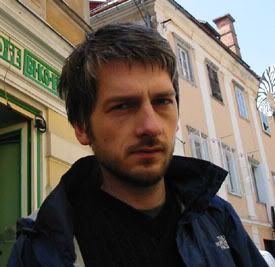|
PRIMOé ČUČNIK |
It Happens All the
Time
like heating in the central heating
ducts
or runners in the central park.
Iím sorry that Iím leaving but itís the only
way for me to go. To leap from
a skyscraper window and hover down
to earth, landing like a feather
batted about by the breeze.
And I believe I could land
like a snowflake or shoes double-tied
together, flung over the lines.
The several-ton ferry breaks the dock
when the ferryman sleeps on the
overnight.
This happens all the time.
That man is an itinerant, walking to every part
of town, certain he has no home.
Sometimes at a stop, he stops,
but he canít shake the feeling.
It seems he fell from a skyscraper so huge
and practically touched the cosmos, but
now
he walks around like a madman, it being
the only way.
But no one notices, the stock market doesnít answer.
I have the feeling Iím from another planet,
that dying is my guest again, some other
eyes
observing me with interest.
But no, I donít feel invited.
I keep hearing a sparrow singing
the saddest songs of all,
and winter will clip its wings.
Tr. by A. Pepelnik
& W. Martin
Cyclists
Who was it that sent them turning
the pedals and grinning on a day in
May.
And together with them on a perfect day
went for a ride and bounced
like a ray off the spikes,
glittering reflectors wedged between.
Distant planets move through them,
without gravity, in slow motion
or very fast like
a reaction in a silent movie.
A test of love.
Men selling strawberries and
cherries under the counter.
Drunkards before it gets too hot.
Grannies preoccupied with their pensions
and white-collared bankers preoccupied
with grannies.
Hairdressers cutting hair on the street, street musicians,
waiters temping in pubs and policemen
preoccupied with public order and noisy
musicians.
Peace seekers and those robbed of peace.
Woman selling bouquets & those
who thank with no, thanks.
Skaters in baggy pants & dustmen
in orange-green.
Who is it that sends them in no light to turn the wheel?
Secretly they know,
itís written on their faces.
One or the other or maybe all at once
in three hundred different ways
called on to send postcards
from towns they are leaving
to towns where theyíre going,
sun-lit newcomers,
those who give money, and those who take
it
those who plan and those who find
themselves
in an open moment.
The painless test.
Everybody has explanations.
Everybody in traffic has his own.
Even in their spare time newspaper vendors
and health-food experts give advice,
and old believers convince fresh
converts.
A run-over sheet of newspaper.
Whatís seen in coffee dregs,
whatís pulled from cards,
whatís heard in the nave
and nailed on the subculture walls.
In the luxury of mild drunkenness
they drive. Sober,
with gods and bags on crossbars
curving between passers-by.
Hit in a car crash,
uninjured, occasionally with bent
forks and a hole in the air-tube,
mildly drunk drivers.
But the wind
blowing around their pants with clothes
pins,
will give a different answer.
Leaning against the sitting bodies, it wants
them to stand up.
With all their weight lean on the pedals
and cut through it.
This is what the wind wants, blowing into their chests,
shifting directions.
The unpredictable sun-wind.
It brings winter and hard times for cyclists.
Turns everything into a question of
absence.
Girls miss them and children
with lollypops and big eyes donít know
what to do.
Punks believe in their imminent arrival
and rappers need them for rhymes.
Grandmas are mending chains
for a new era in paradise:
whizzing between pedestrians,
patching air-tubes, brakes squealing.
Try to pedal in the dark.
Tr. by Ana Pepelnik & Matthew Zapruder
|
|
|
